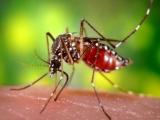In a first for Zika virus vaccine development, Inovio Pharmaceuticals announced today that it has received Food and Drug Administration (FDA) clearance to launch a phase 1 clinical trial of a DNA-based vaccine that it is developing with GeneOne Life Science.
The company's first human trial of the vaccine is launching sooner than it projected last month, when Inovio said it expected clinical trials to begin by the end of 2016.
Trial involves 40 adults
In a press release, Inovio said the open-label, dose-ranging study will include 40 healthy subjects. The vaccine, called GLS-5700, is an intradermal product that combines a DNA vaccine from South Korea–based Gene One with Inovio's proprietary DNA delivery device.
Study participants are slated to receive their first doses in the next weeks, with phase 1 results expected later this year, J. Joseph Kim, PhD, Inovio's president and chief executive officer, said in a press release today. "We are proud to have attained the approval to initiate the first Zika vaccine study in human volunteers," he added.
In February the company reported promising findings in mice, and in the middle of May, Inovio said a trial in monkeys given two doses of intramuscular or intradermal vaccine triggered robust antibody and T-cell responses. In the latter announcement, the company said it expected to launch the first human trial of the vaccine by the end of the year.
Experts have estimated that a Zika vaccine might be available for emergency use, especially for child-bearing-age women in the next 3 to 5 years.
A trial of another DNA-based Zika vaccine—one developed by the National Institute of Allergy and Infectious Diseases (NIAID)—might start sooner than expected as well, Stat News reported today. NIAID Director Anthony Fauci, MD, told Stat that the FDA has the initial paperwork for the vaccine, which showed promise in animal trials.
He said the phase 1 trial was expected to launch in September, but now it looks like it could begin in the middle of August.
At the global level, a target product profile (TPP) of Zika vaccine is being produced to help guide development. In its recent Zika strategy update, covering response steps for the next 18 months, the World Health Organization (WHO) said a final TPP is expected for release by the end of June and that a consultation took place this month to examine regulatory issues expected to affect Zika vaccine use.
Blood pathogen reduction, risk communication, contraceptive challenges
- The US Department of Health and Human Services (HHS) today announced funding for two companies to support the development of pathogen reduction technologies for blood products to reduce the risk of emerging infectious diseases, including Zika virus, in the blood supply. In a statement HHS said the projects will be funded through contracts with the Assistant Secretary for Preparedness and Response's Biomedical Advanced Research and Development Authority (BARDA). One project involves a 3-year $30.8 million agreement with Cerus Corporation, based in Concord, Calif., for trials of its INTERCEPT system for treating red blood cells. The amount includes $10.7 million to evaluate the safety of Puerto Rico's blood system, with a possible extension of 5 years and $149.7 million to cover the next stages, including testing the system in Zika-epidemic regions. In its statement today, HHS also announced a $17.5 million 2.5-year contract with Terumo BCT Technologies, based in Lakewood, Colo., to develop its Mirasol System for reducing infection through platelets. The agreement said the contract may be extended for up to 6 years and $151.8 in additional funding for further study and development.
- In their fourth commentary on Zika virus risk communications, experts Peter Sandman, PhD, and Jody Lanard, MD, said the White House has hijacked a key Centers for Disease Control and Prevention message that local Zika outbreaks are likely but will probably be small and limited. They said the tone became more alarmist in about early April, when the White House started to portray the likelihood of even small domestic outbreaks as widespread and catastrophic and to blame them on Republicans for failure to pass Zika funding. The blog post, based on their excerpts from a late May interview with a news reporter, said the news media and some public health officials have mostly gone along with the White House worst-case scenario messaging, which they said is dishonorable and reflects poor risk communication. "It's probably politically smart. But it is reprehensible risk communication."
- Healthcare companies have donated tens of thousands of intrauterine devices (IUDs) and birth control pill packs to Puerto Rico, but the US territory is struggling to get them to the women who need them, because of health system struggles related to its financial crisis, Reuters reported today. Another problem is that many local doctors don't have the expertise to insert IUDs, because they're typically not stocked, due to high costs to patients.
See also:
Jun 20 Inovio press release
May 16 Inovio press release
Jun 20 Stat News story
June 2016 WHO Zika strategic response plan





















